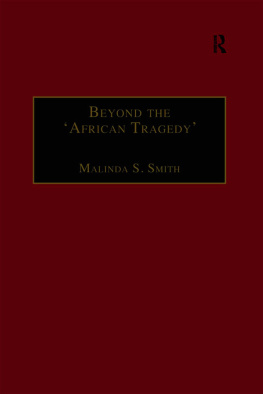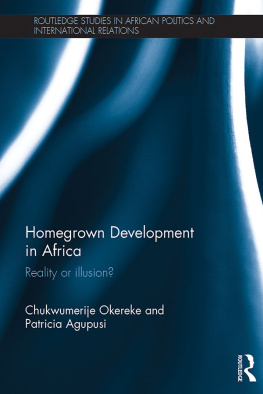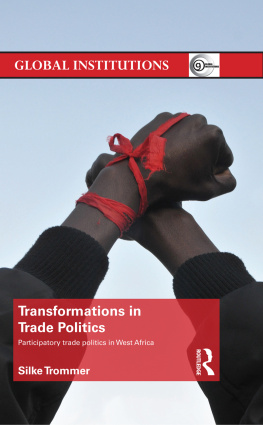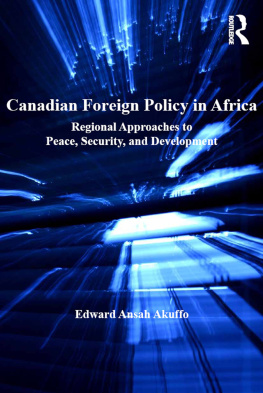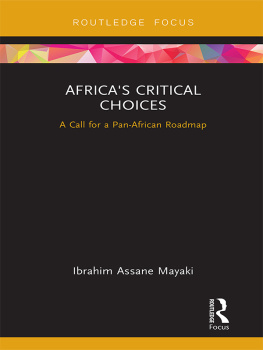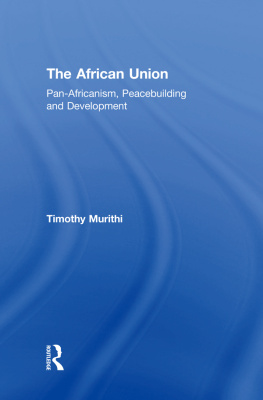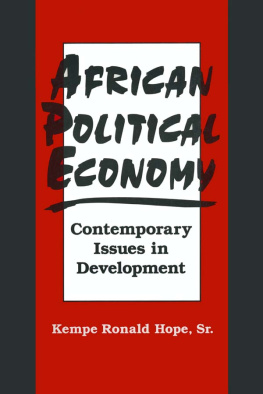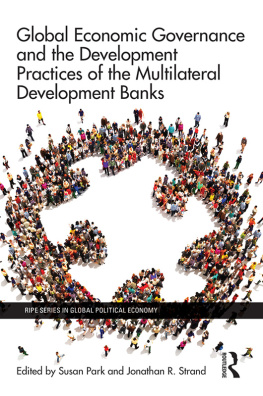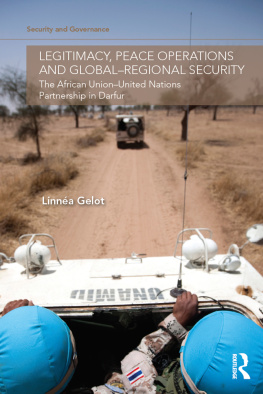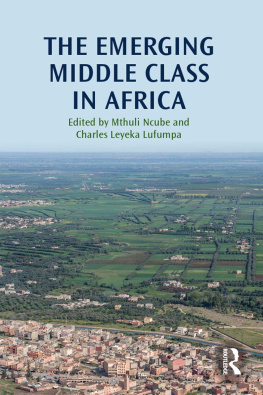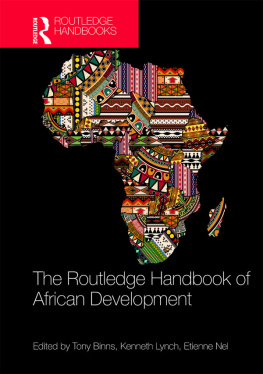BEYOND THE AFRICAN TRAGEDY
To my late mother, Inez O. Smith For her inspiration
Beyond the 'African Tragedy'
Discourses on Development and the Global Economy
Edited by
MALINDA S. SMITH
University of Alberta, Canada
First Published 2006 by Ashgate Publishing
Published 2016 by Routledge
2 Park Square, Milton Park, Abingdon, Oxon OX14 4RN
711 Third Avenue, New York, NY 10017, USA
Routledge is an imprint of the Taylor & Francis Group, an informa business
Copyright Malinda S. Smith 2006
Malinda S. Smith asserted her moral right under the Copyright, Designs and Patents Act, 1988, to be identified as the editor of this work.
All rights reserved. No part of this book may be reprinted or reproduced or utilised in any form or by any electronic, mechanical, or other means, now known or hereafter invented, including photocopying and recording, or in any information storage or retrieval system, without permission in writing from the publishers.
Notice:
Product or corporate names may be trademarks or registered trademarks, and are used only for identification and explanation without intent to infringe.
British Library Cataloguing in Publication Data
Beyond the 'African Tragedy': discourses on development
and the global economy
1. Globalization - Economic aspects - Africa, Sub-Saharan
2. Globalization - Political aspects - Africa, Sub-Saharan
3. Africa, Sub-Saharan - Economic conditions - 1960
4. Africa, Sub-Saharan - Politics and government - 1960
I. Smith, Malinda
338.9'67
Library of Congress Cataloging-in-Publication Data
Beyond the 'African tragedy': discourses on development and the global economy /
edited by Malinda S. Smith.
p. cm.
Includes bibliographical references and index.
ISBN-13: 978-0-7546-4824-6
ISBN-10: 0-7546-4824-9
1. Africa--Economic integration. 2. Africa--Economic policy. 3. Africa--Economic
conditions--1960- 4. Africa--Foreign economic relations. 5. Africa--Politics and
government--1960- 6. New Partnership for Africa's Development. I. Smith, Malinda.
HC800.B523 2006
338.96--dc22
2006018453
ISBN 13: 978-0-7546-4824-6 (hbk)
Contents
Abdella Abdou is an Assistant Professor in the Department of Economics at Brandon University, Manitoba, Canada.
Jm O. Adsn is a Professor of Sociology at Rhodes University, South Africa, external research coordinator for the UN Research Institute on Social Development in Geneva, and a member of the Executive Committee of Council for the Development of Social Science Research in Africa (Codesria), in Dakar, Senegal.
Obijiofor Aginam is Assistant Professor of Law at Carleton University, Ottawa, Canada, and former Attorney & Research Associate, Olisa Agbakoba & Associate in Nigeria.
Patience Akpan-Obong completed a post-doctoral fellow in the School of Management at Arizona State University West, Meza, Arizona, and teaches at the Universitys East College, Polytechnic Campus.
Adekunle Amuwo is a Professor of Political Science and currently the Executive Secretary of the African Association of Political Science (AAPS), based in Pretoria, South Africa.
Ishmael Lesufi is a Lecturer in the Department of Sociology in the field of industrial sociology and sociological theory at the University of South Africa.
Cosmas Mbuh is a Research Student in the School of Politics, International Relations and Philosophy at Keele University, in Straffordshire, United Kingdom.
Chaldeans Mensah is a College Professor in the Department of Anthropology, Economics and Political Science, Grant MacEwan College, Edmonton, Alberta.
Jacob W. Musila is an Associate Professor of financial economics at Athabasca University in Athabasca, Canada.
Francis Owusu is an Assistant Professor in the Department of Community and Regional Planning at Iowa State University, Iowa, United States.
Korbla Peter Puplampu is a College Professor of Sociology at Grant MacEwan College in Edmonton, Alberta, Canada.
Zo Randriamaro is a sociologist and womens rights activist from Madagascar. She has served as an expert for the major international organisations (UNDP, NFPA, FAO, UNIFEM, and USAID) and is the former Manager of the Gender and Economic Reforms in Africa (GERA) Programme at the Third World Network Secretariat for Africa.
Simon Pierre Sigu is an Associate Professor of Marketing at Athabasca University, Canada, and an honorary associate professor at the School of Business, Universidad de Los Andes, Colombia.
Malinda S. Smith is an Associate Professor of International Relations and Comparative Politics, and Coordinator of Globalisation and Governance in the Department of Political Science at the University of Alberta in Edmonton, Canada.
Ian Taylor is Senior Lecturer in International Relations at the University of St. Andrews, Scotland, Professor Extraordinary in Political Science at the University of Stellenbosch, South Africa and Visiting Lecturer to the Faculty of Development Studies, Mbarara University of Science and Technology, Uganda
The contributors to this volume trace and critique both historical and contemporary discourses on development in the African postcolonies, and offer critical insights into the complexities, contingencies, ruptures and transformations embodied in official development strategies. The essays in Beyond the African Tragedy: Discourses on Development and the Global Economy interrogate African postcolonial development strategies from a political economy perspective, underlining that these discourses of development, are shaped by specific social forces and relations of power and knowledge. The book especially is concerned with how the reductive repetition motif of African tragedy can be understood as forming and performing the continent. The critiques of development discourses show that words do matter, and words like tragedy, crisis, failed or weak both have specific meanings and evoke particular feelings . In the case of Africa, the words, phrases, and expressions invoked in development discourses, too frequently are laced with afro-pessimism, and a sense of fatalism: Bad things happen in Africa; it is the continents destiny. This books essays problematise the discursive practices that have assigned particular diagnoses such as crisis and tragedy, to the African geopolitical space.
Each essay provides a critical analysis of both the discourses and specific policies of the neoliberal imperial project, and its construction of Africa, whether as tragedy or, as in the frequently repeated moral discourse of British Prime Minister Tony Blair, as a scar on the conscience of the world. This moral-speak in the form of I feel your pain, is part of the seductiveness of development discourse. The rhetorical identification with African suffering simultaneously elicits sympathy, and at the same time, distracts from a more critical perspective on the history and political economy of African development. The contributors believe that we must pay greater attention to the violence of neoliberalisms epistemic narratives and how development strategies account for or discount the structural violence of neoliberalism as a development project.
At the outset of the twenty-first century, African leaders notably Thabo Mbeki of South Africa, Olusegun Obasanjo of Nigeria, Abdoulaye Wade of Senegal and Abdelaziz Bouteflika of Algeria, along with their international allies, crafted a global partnership or compact for development, the New Partnership for Africas Development (Nepad). It provides a useful springboard from which to reflect upon the history of African development, from decolonisation to the current moment, which is shaped by neoliberal globalisation and the war on terrorism. Nepad was designed, its proponents argue, to demonstrate a new political will on the continent that was committed to good governance, poverty reduction, market reform, and integrating the continent into the global economy. This new partnership was officially adopted by the Organisation of African Unity and, subsequently, by the African Union. It received widespread support from world leaders and international institutions, particularly the G8, the European Union, the Organisation for Economic Cooperation and Development, World Bank and International Monetary Fund, and the United Nations system. Nepad was viewed by these institutions as the most significant development plan to have emerged from African leaders in the postcolonial period and, with this high praise, it became the strategic framework through which regional and international organisations and the donor community would engage Africa. Thus, for our purposes Nepad provides a discrete moment to reflect on historical and contemporary development discourses in the African postcolonies.

